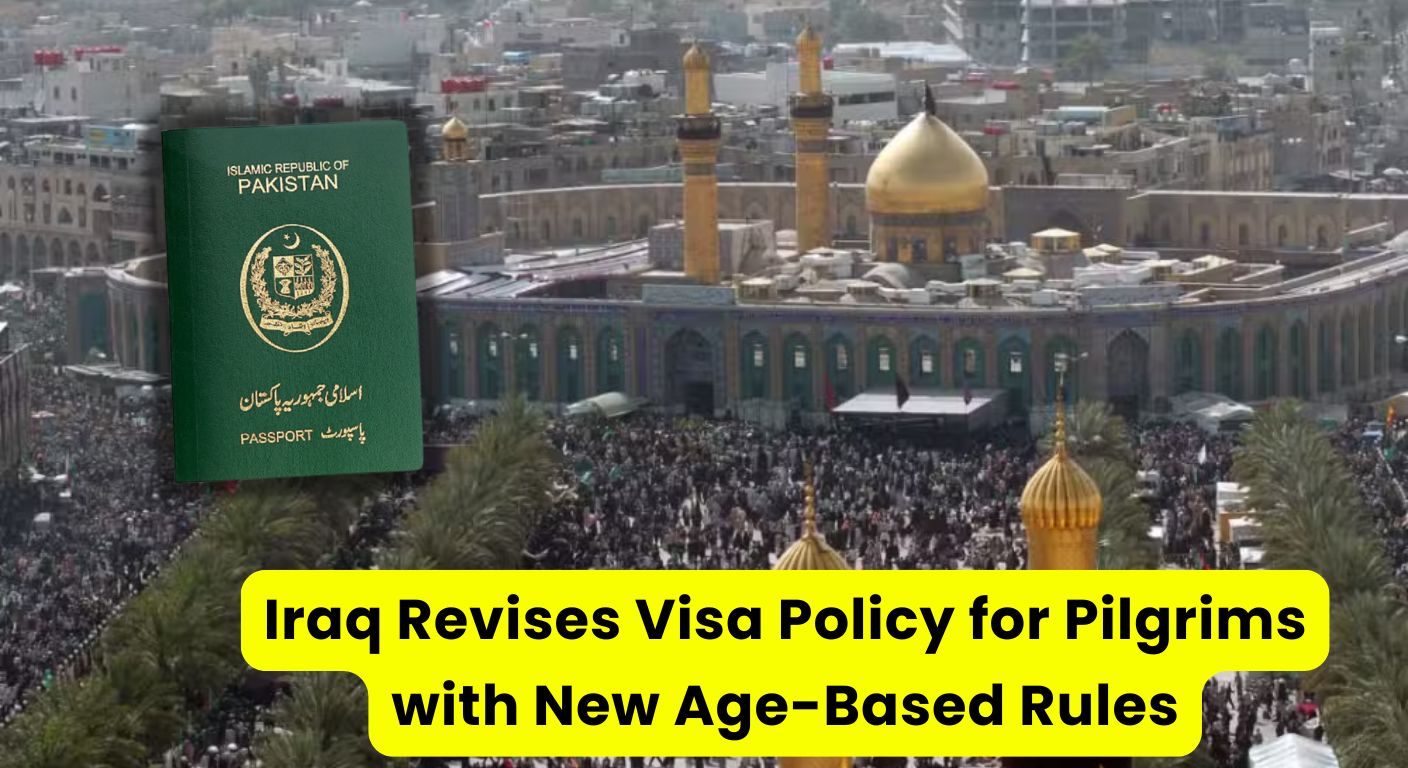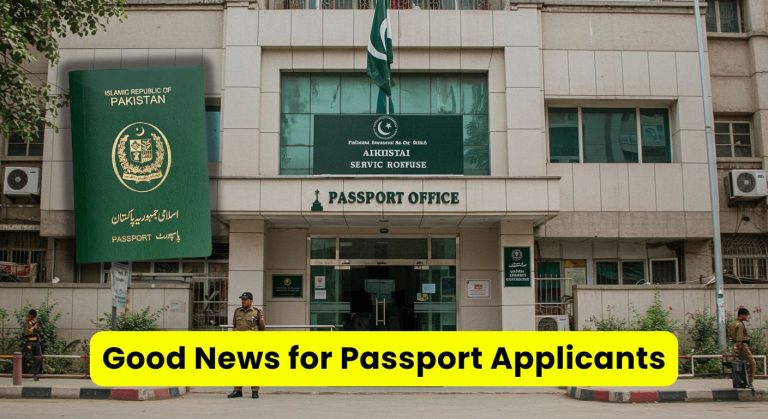Iraq Revises Visa Policy for Pilgrims with New Age-Based Rules

BAGHDAD/ISLAMABAD – September 18, 2025: Iraqi authorities have announced a significant change in their visa policy for international pilgrims traveling to the country’s sacred religious sites. The updated regulations introduce new age-based requirements, aiming to make pilgrimages safer, more organized, and manageable, particularly during peak seasons when millions of visitors gather.
Key Changes in the Visa Policy
According to the revised rules, men under the age of 50 will no longer be eligible to apply for a pilgrimage visa if traveling alone. However, exceptions will apply for those who are accompanied by their families.
Officials explained that the updated policy is not a restriction on religious freedom but rather a practical measure to ensure smooth management of pilgrim inflows. With Iraq hosting millions of visitors annually, especially during Arbaeen and Ashura gatherings, the authorities are seeking to avoid overcrowding and ensure adequate security.
Official Statement from Pakistan
The announcement was confirmed by Muhammad Umar Butt, spokesperson for Pakistan’s Ministry of Religious Affairs and Interfaith Harmony. He explained that the Iraqi government had informed Islamabad about the new rules, and pilgrims planning their journey must now comply with these requirements.
Mr. Butt added that the ministry would issue updated guidelines for Pakistani pilgrims and coordinate with travel agencies to make sure that applications are submitted according to the new policy. He stressed the importance of reviewing the rules carefully before applying, to avoid visa rejections or travel disruptions.
Purpose of the Revised Policy
Iraqi officials highlighted several reasons behind the decision:
- Security: Managing younger pilgrims who travel alone can be challenging during mass gatherings. By restricting solo travel for men under 50, authorities hope to reduce risks.
- Logistics: Family groups are easier to organize in terms of accommodation, transport, and movement within shrine areas.
- Safety: With millions converging on holy sites in Najaf, Karbala, and Baghdad, age-based rules can help ease crowd pressure and ensure a safer environment.
Authorities emphasized that the goal is not to block pilgrims but to improve the overall experience by providing more organized services and minimizing chaos during peak seasons.
Global Scope of the Rules
The updated requirements are not limited to Pakistan. They apply to all international pilgrims, regardless of nationality. Any foreign applicant seeking a visa for Iraq’s holy shrines will now need to follow the new age criteria.
Travel operators have been advised to adjust their packages and inform customers in advance about the change. Officials also suggested that prospective pilgrims should prepare alternative plans if they do not meet the eligibility requirements.
Reactions from Pilgrims and Religious Groups
The policy shift has triggered mixed reactions among religious communities.
Some elderly pilgrims and families have welcomed the decision, saying it may help reduce overcrowding and improve security. A family from Lahore planning to travel this year said, “When millions gather at Karbala, the conditions are overwhelming. Families feel safer when the authorities impose rules that make the journey more controlled.”
On the other hand, younger pilgrims under 50 who usually travel alone expressed disappointment. Many believe the policy will restrict their spiritual opportunities. A 35-year-old from Karachi noted, “For years, I have dreamed of visiting Karbala. Now I will have to wait or travel with family, which may not always be possible.”
Religious scholars in Pakistan have urged calm, emphasizing that while the new rules may appear restrictive, they are introduced with the safety of pilgrims in mind.
Importance of Pilgrimage to Iraq
Iraq is home to some of the most revered shrines in the Islamic world, particularly for Shia Muslims. Millions travel annually to the cities of Najaf, Karbala, Baghdad, and Samarra, visiting the shrines of Imam Ali, Imam Hussain, and other holy figures.
The annual Arbaeen pilgrimage, marking the 40th day of mourning after Ashura, attracts one of the largest religious gatherings in the world, with over 20 million pilgrims recorded in recent years. Managing such massive crowds requires strict security measures and well-planned logistics.
For many believers, visiting these holy sites is not only a spiritual journey but also an expression of faith, unity, and devotion.
Challenges Faced by Iraqi Authorities
Hosting millions of international visitors comes with enormous challenges. Iraqi authorities often struggle with:
- Accommodation shortages in major shrine cities.
- Transport congestion, with thousands of buses and cars flooding the roads.
- Security risks, as large gatherings can be vulnerable to terrorist attacks.
- Health concerns, including overcrowding, dehydration, and limited medical facilities.
By introducing the new visa rules, Iraq hopes to reduce some of these challenges and ensure smoother management during upcoming pilgrimages.
Regional and International Implications
The decision is expected to affect pilgrims from countries such as Iran, Pakistan, India, Lebanon, Bahrain, and Afghanistan, where large numbers of people regularly travel to Iraq for religious purposes.
In Pakistan alone, tens of thousands apply for pilgrimage visas each year. Travel agencies in Karachi, Lahore, and Islamabad are already revising their packages to comply with the new guidelines. Industry experts warn that solo travelers under 50 may now face difficulties unless they join family groups or community delegations.
Advice to Pilgrims
The Pakistani Ministry of Religious Affairs has advised pilgrims to:
- Carefully check their eligibility before applying for visas.
- Prefer traveling in groups or with families to avoid rejection.
- Contact only registered travel operators to ensure compliance with Iraqi regulations.
- Stay updated through official ministry announcements and embassy notifications.
Officials also encouraged younger pilgrims who may not qualify to remain patient and consider planning for future visits when circumstances allow.
Looking Ahead
This policy marks a shift in Iraq’s approach to managing pilgrimages. By focusing on age and family status, the authorities hope to create a more structured system for handling the massive inflow of visitors.
Experts believe that if the rules prove successful in reducing overcrowding and improving safety, they may become a permanent feature of Iraq’s visa policy. However, the effectiveness of the new regulations will only be clear after the upcoming pilgrimage season.
Conclusion
The decision by Iraqi authorities to revise visa regulations with new age-based conditions has introduced an important change for international pilgrims. While the policy restricts solo travel for men under 50, it reflects Iraq’s attempt to balance religious devotion with practical security and logistical concerns.






